Ever Read online
DEDICATION
To Bev and Allan, friends forever
ACKNOWLEDGEMENT
Many thanks to Betsy Levine for guiding me through the mysteries of knotted rug weaving.
EPIGRAPHS
Then Jephthah came to his home at Mizpah; and there was his daughter coming out to meet him with timbrels and with dancing.
JUDGES, 11:34
. . . dust is their food, clay their bread.
They see no light, they dwell in darkness,
They are clothed like birds, with feathers.
THE DESCENT OF ISHTAR
TO THE UNDERWORLD,
MESOPOTAMIAN MYTH
CONTENTS
Dedication
Acknowledgement
Epigraphs
1 Olus
2 Kezi
3 Olus
4 Kezi
5 Olus
6 Kezi
7 Olus
8 Kezi
9 Olus
10 Kezi
11 Olus
12 Kezi
13 Olus
14 Kezi
15 Olus
16 Kezi
17 Olus
18 Kezi
19 Olus
20 Kezi
21 Olus
22 Kezi
23 Olus
24 Kezi
25 Olus
26 Kezi
27 Olus
28 Kezi
29 Olus
30 Kezi
31 Olus
32 Kezi
33 Olus
34 Kezi
35 Olus
36 Kezi
37 Olus
38 Kezi
39 Olus
40 Kezi
41 Olus
42 Kezi
43 Olus
44 Kezi
45 Olus
46 Kezi
47 Olus
48 Kezi
49 Olus
50 Kezi
51 Olus
52 Kezi
53 Olus
54 Kezi
55 Olus
56 Kezi
57 Olus
58 Kezi
59 Olus
60 Kezi
61 Olus
62 Kezi
63 Olus
64 Kezi
65 Olus
66 Kezi
67 Olus
68 Kezi
69 Olus
After Kezi
Extras
Behind the Book with Gail Carson Levine
Deleted Chapters from Ever
An Interview with Gail Carson Levine
A Sneak Peek at Gail Carson Levine’s Next Novel, A Tale of Two Castles
Back Ads
Other Books
About the Author
Copyright
About the Publisher
1
OLUS
I AM HUGE IN MY MATI’S womb, straining her wide tunic. She is Hannu, Akkan goddess of the earth and of pottery. My pado, Arduk, god of agriculture, sits at Hannu’s bedside, awaiting my birth.
It is too tight in Hannu’s belly! I thread my strong wind into her womb, and my strong wind thrusts me flying out. Fortunately, Arduk catches me in his big, gentle hands.
Although Hannu lies in bed and Arduk stands holding me, we are also floating above the earth. In the air over volcanic Mount Enshi hovers Enshi Rock. From its center the temple rises: our home, a tower of porous white stone mounted on four stout stone legs. Never has there been such a temple!
When my diaper cloth is tied in place, I kick. When I’m lowered into my sleeping basket, I cry. If a blanket is tucked around me, I bellow. I am the god of the winds, and I hate confinement. Shame on me! I fear it.
Hannu and Arduk name me Olus. I call them by their own names, as is the custom.
Soon I can see and hear and smell across great distances and through objects, just as the other Akkan gods can. I hear the prayers of our worshipers, which are like the rattle of pebbles in a pan, too numerous to sort out.
When I am a month old, I smile from my parents’ bed at the faces of the other Akkan gods and goddesses as they pass by above me. Meanwhile my merry wind tickles their ankles.
But when Puru, the god of destiny, tilts his head down at me, my merry wind fades away, and I wail. His face is swathed entirely in orange linen, as is the rest of him. I can see through ordinary linen, but not Puru’s.
Perhaps he can peer through his linen, or perhaps he smells me or only knows I’m there. When he speaks, no constant breath pushes his words, so he stops after each one. “Olus . . . will—”
“Hush, Puru,” Hannu says, frowning.
“He’s too young to hear about his fate,” Arduk adds.
Puru says, “Olus . . . will . . . have . . . no happiness until he gains what he cannot keep.”
2
KEZI
I DAMPEN MY SQUARE OF CLAY from my bowl of water. Mmm. The water is cool on my hot fingers. Thank you, Admat, for the cool water and the soft clay.
Evening is coming. I’m on the mud-brick floor of our reception room in my pado’s house in the city of Hyte. The clay is on a plate in my lap. Using one of my pado’s styluses, I’m drawing dancing ostriches in the clay. The ostriches will bob and skip across the next rug I weave. I love to make rugs and to dance.
My aunt Fedo sits in the copper-inlay chair, her leather sack on her lap, her cane leaning against a chair arm. She is telling our servant Nia about buying pomegranates in the market. Nia rests her elbows on the high table. Her face is blank. She smiles only when she is praying.
Looking down at my clay, I scratch in an ostrich leg.
Bang!
Before I can see what happened, I am in Aunt Fedo’s arms, and she is limping across the room with me. She is shouting, “Snake!”
Nia yells, “Admat!”
I try to turn my head to see, but Aunt Fedo is holding me too tight. She rushes through the door frame to our courtyard. I hear more running feet and Pado and Mati shouting too.
Aunt Fedo yells that an adder was about to strike me. She caned it, but she isn’t sure if it’s dead.
“I’ll get an axe.” Pado’s feet thud the other way.
Mati takes me and holds me in the air away from her. She eyes me up and down, side to side. When she lets me go, I start back toward the reception room, hoping to glimpse the snake.
Mati pulls me back. “Fedo! Thanks to Admat you were here.”
“Thanks to Admat, who gave me owl eyes.”
Nia echoes, “Thanks to Admat.”
Adders are supposed to have lips like people, and their mouths are supposed to close into a grin. Instead of ostriches, my next carpet will be of smiling adders, doing a zigzag dance.
When Pado returns, he gives me my clay and bowl of water and hands Aunt Fedo her sack. He says the snake is dead. I feel close to tears.
“Your house’s omens were mixed today, Senat,” Aunt Fedo says to Pado. “The snake was bad, but my cane was good. Perhaps Admat took away the strength in my legs so I could save Kezi.”
I separate myself from Mati and take Aunt Fedo’s hand. “Come see my new rug.” I tug her to the courtyard recess, where my child’s loom for rugs sits next to Mati’s loom for cloth. “I didn’t finish.” Above the three dancing mongooses, the top border and my name in wedge letters are yet to be knotted in. I knot from side to side, as I was taught. So the letters of my name will grow gradually, all together, not one at a time.
Aunt Fedo leans back on her heels. “Those mongooses can dance! How old are you, Kezi?”
“Seven and a half.”
“My niece is a marvel.” She gives me a date candy from her sack. “Have you seen the carpet, Senat? One mongoose is leaping.”
Pado nods, but I can tell he’s not think
ing about my rug. We return to him and Mati.
“Thank you for saving Kezi,” Pado says. He pulls me against his legs.
“Thanks to Admat,” Mati adds. “The one, the all.”
As I’ve been taught, I say, “As he wishes, so it will be.”
Aunt Fedo says, “Senat, you should hire a masma to cast a spell to rid the house of vermin.”
A masma is a sorcerer. I’d love to meet a masma, but Pado would never hire one.
“We’ll be fine,” he says. He strokes my hair straggles away from my forehead. “Fedo, we’re in your debt forever.”
Aunt Fedo waves the words away, but Mati echoes, “Forever.”
Proud of myself for remembering, I quote the holy text. “A debt unpaid . . .”
“Hush, Kezi,” Mati says, sounding nervous.
I hear Nia whisper,
“A debt unpaid is an open wound.
Admat will make it fester.”
3
OLUS
I AM THE GOD OF LONELINESS as well as of the winds. My brother Lumar, the god of sweet water, closest to me in age of all the gods, is 423 years old. I am eleven, and I have no friends.
From my open-air bedroom on the roof of the temple, I study the mortal children of Akka, listen to their conversations, imitate their speech, practice their gestures. I even starve myself to be as skinny as they are.
My mati Hannu calls me a pretend mortal.
My favorite real mortal is a boy named Kudiya who lives in a hut halfway down Mount Enshi. He is kind and brave, and I want him to be my friend. One moonlit night, I decide to visit him. Before this, I’ve descended from Enshi Rock only for my annual festivals, and then my parents have come with me on their winged steeds. Whenever I’ve proposed going alone on one of my winds, my pado, Arduk, has looked worried, and Hannu has pounded her fist into her ball of clay.
But now they’re asleep. If they discover I’m gone, it will take them a while to spot me and even longer to saddle their flying horses. None of the gods has true flight. I can ride my winds, and Puru, the god of destiny, can disappear and reappear wherever he likes, or wherever fate takes him. But the others depend on their mounts.
As soon as I plunge below Enshi Rock on my night wind, I feel the chilly mountain air. Goose bumps rise on my arms. I don’t know if they are caused by the cold or by my nervousness.
For at least five minutes I stand outside Kudiya’s doorway, gathering my resolve. Finally, I push aside the sheepskin that hangs across the doorway. The hut is tiny. Fear of confinement adds to my unease. I bring my comforting breeze in with me, softly, softly, so Kudiya’s parents will continue to sleep. My quiet wind cushions my steps. I crouch next to Kudiya’s mat and stare. Wake up! He rolls over and flings out an arm.
I hiss, “Psst.”
He slumbers on.
I touch his outflung arm. His eyes snap open.
“Greetings, friend,” I whisper. I repeat, “Friend. Friend.” I beckon him to follow me.
Outside, he says, “Olus!”
How does he know? In our reflecting pool on Enshi Rock, I look like any mortal boy who’s tall for his age.
He shouts at the sky, “I’m having a vision!”
Hastily I cover his voice with my sighing wind. “Sh! I’m really here.”
He shakes his head. “You’re a vision, and you’ll bring us luck all year.”
“Touch me, Kudiya.”
“In my vision I touch your arm.” He does so.
We can’t be friends if he keeps thinking I’m a vision. I lift my tunic, pull aside my loincloth, and pee on the grass. “Would a vision do this?”
“Yes! A funny vision!” He shifts his loincloth and pees too. “Tomorrow there will be no brown grass, because I never left my mat.”
In the morning he’ll know the truth. “Let’s race.”
We tear through Kudiya’s tiny hamlet of five huts. I don’t use my winds to speed me along, although Kudiya is swifter than I am. We approach the Izin, a wide and sluggish river.
“You win,” I say.
We push through a forest of reeds and squeeze our toes in the river’s muddy bottom. The mud is so soft. My grin feels wide enough to touch my ears.
Kudiya tires of squelching. We return through the reeds to lie on the bank and stare up at the stars and at the underside of Enshi Rock, a small irregular black oval in the midnight-blue sky.
“What does this vision mean?” Kudiya asks.
“I’m not a vision.”
“Visions don’t tell what they mean. My parents will hire a diviner.”
“If I tell you why I’ve come, will that prove I’m not a vision?”
“No. But tell me.”
I hesitate. I’ve come in the hope he’ll be my friend, but I’ve observed that friendships grow gradually. One person doesn’t announce he wants a friend. I try to think of another reason for my visit.
He snores. My cradling wind wafts him back to his sleeping mat while I return to the temple roof, where Hannu and Arduk are waiting.
Even before I land, she shouts. “Where did you go?”
“Your mati was frightened, Turnip,” Arduk says. Turnip is his nickname for me, because he created turnips for my first birthday. He adds, “You could have been hurt.”
Gods can be injured, although we heal quickly.
“Where did you go?” Hannu repeats, louder than before.
“Just to a hut.” I tell them my adventure.
“Turnip . . .” Arduk sighs. “This boy will—”
“Friendship with a worshiper is impossible. Look at the boy tomorrow. You’ll see.”
I’m sure Hannu is wrong. My parents have little interest in mortals. Hannu doesn’t mean to, but sometimes she hurts them. She grows angry when her pottery doesn’t go well. If she is angry enough, rocks roll down mountains and fissures open in the earth.
The next day I watch and listen from the temple roof. At dawn Kudiya wakes his parents and pulls them outside, chattering about his vision.
He jumps like a puppet when he sees the brown grass. I laugh until I see his terror. His parents are terrified too. I listen to their conversation. It never occurs to me that I’m spying or eavesdropping. We gods have always watched and listened to mortals.
“He peed on our land?” Kudiya’s pado says.
“You peed after he did?” Kudiya’s mati says.
Kudiya nods.
“And then he left?” his pado adds.
“No. We raced to the river.”
“You let him win?” his mati asks. “Yes?”
Kudiya shrugs.
“You won! You offended him!” his pado says. “He was angry to begin with, and you made him angrier.”
They pray for an hour. I want to fly down and reassure them, but now I understand that I’ll frighten them even more. They sacrifice a sheep to me from their meager herd of three. I don’t want their poor sheep.
Over the next year I give them all the good fortune I can. I send rain clouds when their land is parched, blow away the clouds when sunshine is needed, keep their animals from wandering. The family prospers.
I don’t return to Kudiya or visit any other Akkan mortals.
When I am seventeen, I leave Enshi Rock. I hope to end my loneliness by living among mortals. Because I want to come and go unrecognized, I depart Akka too, although I promise my parents that I’ll return yearly for my festival.
Hannu is too angry with me to say farewell. Arduk asks me to down a goblet of therka with them before I go.
Therka is the beverage of the Akkan gods. We enjoy other drinks, too, and eat whatever food we like, but therka satisfies us as nothing else. It contains honey, flower juice, and Enshi Rock water, but the most important ingredients are extracts of each god’s and goddess’s power. On my ninth birthday, I added wind to the therka.
I gulp down my drink, eager to leave. Hannu sips hers to delay me. When she puts down her goblet, I kiss her. She turns her cheek away but squeezes my shoulder.
“We’ll miss you, Turnip,” Arduk says.
I nod. I’ll miss them, but I’m happy to be leaving. I don’t anticipate how difficult it will be to pretend to be mortal.
First I join a camel caravan as a spice merchant’s servant. I am kicked by the merchant’s camel, then by the merchant. My mischievous wind wants to take revenge, but I do the job myself. While the merchant sleeps, I steal his cargo and fly off on my steady wind. I deposit his little spice bags, one by one, on the route ahead. He will find them, or someone else will cook a tasty stew.
Next I’m hired as a jeweler’s helper. I am indoors all day, which I can hardly bear, even though the jeweler’s workshop is spacious. I like the man and enjoy his stories about who will wear this necklace and that bracelet. I fancy we’re friends and become too zealous on his behalf. When I use my nimble wind to speed the bead drill, he becomes afraid. Trembling, he dismisses me.
I harvest millet. On the second day a sickle gashes my leg. The wound will heal too quickly. I depart before I can become a source of fear again.
Now I despair. I’m not ready to live among mortals, in their very midst. I gather a cloud around myself and ride my winds over the lands surrounding Akka, seeking I don’t know what.
Everywhere people are together—except for the shepherds and the goatherds. I decide to try goat herding. I’ll still be lonely, but I’ll observe people without being observed myself. When I’m prepared, I’ll rejoin humanity.
Near the city of Hyte I discover a small valley of good grazing land, part of the estate of a palace official named Senat. The brook that waters the valley is a miracle in this dry countryside.
Senat is willing to rent the valley to me. “As your flock grows,” he says, “give me one kid in ten and you can stay as long as you like.”
It’s better than a fair rate. I begin my new life with the purchase of a dozen goats and a donkey, paid for with a silver goblet from Akka. I build a pen for the goats to stay in at night and dig a cellar to protect my goat’s milk and goat cheese from the heat of the day.
Senat’s generosity interests me, so he becomes the first mortal I observe. I watch him in his city house, and my attention is captured. I can hardly look away. My clever wind does my herding.
Senat and his family are what I’ve wanted. His daughter, Kezi, dances through the house. My eyes can barely keep pace with her feet. She and her mati, Merem, weave together. Merem makes bawdy jokes. Her daughter blushes. Merem’s fabric loom turns out tunics and cloaks and scarves, useful and handsome. Kezi’s rugs are more than useful. Her subjects are common things—a thistle, three pebbles, a scorpion—made uncommon by her artistry. My favorite is the thistle rug. The flower’s spines turn it into a miniature sun, and the hairs on the leaves are an army of silver arrows. Her name in the top border twists cleverly in and out of a leafy vine.

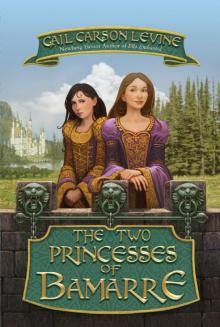 The Two Princesses of Bamarre
The Two Princesses of Bamarre Dave at Night
Dave at Night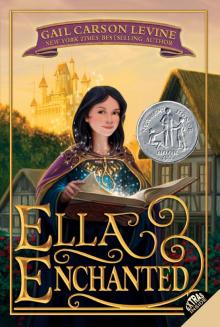 Ella Enchanted
Ella Enchanted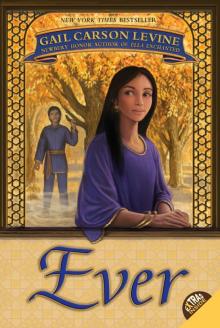 Ever
Ever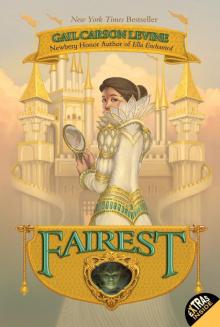 Fairest
Fairest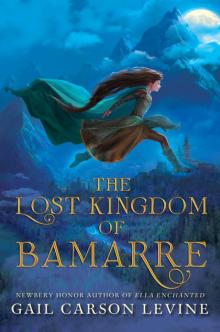 The Lost Kingdom of Bamarre
The Lost Kingdom of Bamarre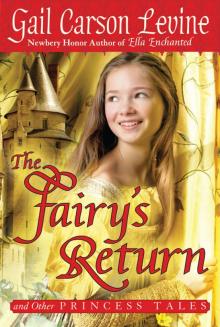 The Fairy's Return and Other Princess Tales
The Fairy's Return and Other Princess Tales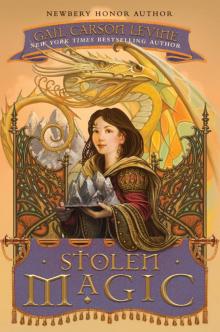 Stolen Magic
Stolen Magic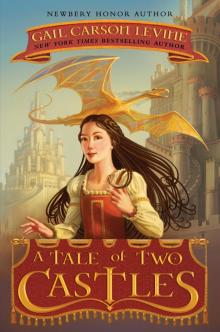 A Tale of Two Castles
A Tale of Two Castles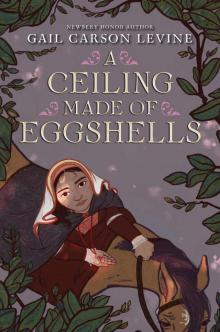 A Ceiling Made of Eggshells
A Ceiling Made of Eggshells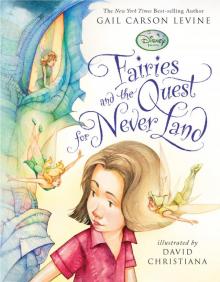 Fairies and the Quest for Never Land
Fairies and the Quest for Never Land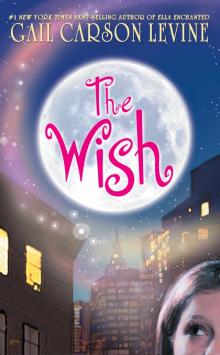 The Wish
The Wish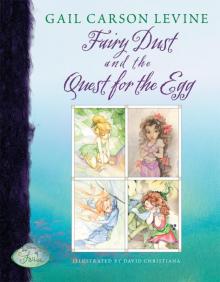 Fairy Dust and the Quest for the Egg
Fairy Dust and the Quest for the Egg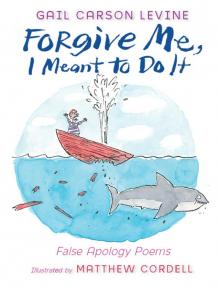 Forgive Me, I Meant to Do It: False Apology Poems
Forgive Me, I Meant to Do It: False Apology Poems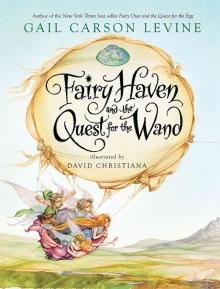 Fairy Haven and the Quest for the Wand
Fairy Haven and the Quest for the Wand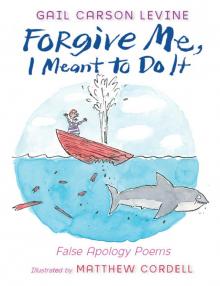 Forgive Me, I Meant to Do It
Forgive Me, I Meant to Do It